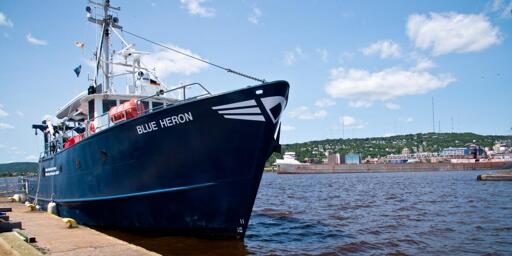64
When Large Lakes Observatory (LLO) Marine Superintendent Doug Ricketts brought a cup of tar-like substance to researchers last September and asked, "Think you guys could do anything with this?" he probably wasn't expecting to launch the discovery of a brand-new species. But that's exactly what happened when UMD scientists examined the mysterious "ship goo" seen oozing from the R/V Blue Heron's rudder shaft during an unanticipated repair.The research vessel, which had been pulled out of Lake Erie into the Great Lakes Shipyard, Cleveland, to fix a noisy propeller shaft, yielded an unexpected treasure: previously unknown microorganisms thriving in the warm, oxygen-free environment of the rudder shaft housing. Lead researcher Cody Sheik, a biologist at UMD and LLO, and his team temporarily dubbed their discovery "ShipGoo001".Unexpected Life Form"The biggest surprise was that the ship goo had life in it at all," Sheik explained. "We thought we'd find nothing. But surprisingly, we found DNA and it wasn’t too destroyed, nor was the biomass too low."Instead, through DNA sequencing and comparison with global databases, the team confirmed they had discovered entirely new species. The microbes appear to thrive in the peculiar conditions found in the rudder shaft: a semi-warm, stable environment with no oxygen, where the grease creates a unique ecological niche.The discovery highlights how much remains unknown, even in familiar places. While the Sheik Lab has extensively studied microbes living in extreme environments like Lake Superior, deep ocean hydrothermal vents, and hot springs, the built environments we interact with daily–from ships to buildings–remain drastically undersampled.Home of DiscoveryThe R/V Blue Heron is part of the US Academic Research Fleet, a flotilla of ships owned by the United States government to conduct research in oceans and coastal waters. The Large Lakes Observatory at the University of Minnesota Duluth operates the R/V Blue Heron, which is the only academic research vessel designated for the study of the US Great Lakes. While many of these research fleet vessels have helped discover new life in the oceans, this is the first time that new life has been discovered on a ship itself!The ‘ship goo’ organisms appear to be part of a complex food web, possibly even contributing to biocorrosion of the metal rudder shaft. Interestingly, while the particular species ShipGoo001 is new to science, some of its companions have been found in tar pits and petroleum wells around the world, suggesting these microbes may be more widespread than initially thought.The discovery raises intriguing questions, like where did these organisms originate? The lake waters surrounding the vessel are oxygenated, yet these microbes can only survive without oxygen. Sheik speculates they may have been dormant in the oil used to grease the rudder, waiting until conditions were right for growth. The fact that no oozing was observed during the vessel's previous maintenance in November 2021 adds another layer of mystery.Beyond satisfying scientific curiosity, the discovery could have practical applications. Some organisms in the “ship goo” appear to be methane producers, potentially useful for biofuel production. The next steps involve studying what these microbes actually do in their environment and understanding their metabolic processes.Take Time To Be Curious The warm, oxygen-free environment of the greased rudder shaft housing unexpectedly provides a home for previously unknown microorganisms. The find also underscores the importance of supporting basic science and allowing researchers the freedom to explore. "Scientists don’t often have time to be playful – we're focused and have projects to complete," Sheik said. "Time and resources for exploratory work can be daunting. But this shows why it matters."Following standard scientific protocol, the team will make the genome publicly available in repositories and publish their findings in peer-reviewed journals, allowing other scientists to build on their work.As for the official name, that remains to be determined. Sheik plans to collaborate with the community later this summer to help name the species."It's fun science," Sheik concluded. "By calling it ship goo for now, it brings some joy to our science. We can find novelty wherever we look."The discovery serves as a reminder that even in our everyday environments–or in this case, in the oily recesses of a research vessel–nature continues to surprise us. Sometimes the most remarkable discoveries come not from distant planets or exotic locations, but from the things we work with every day.



Good for them!